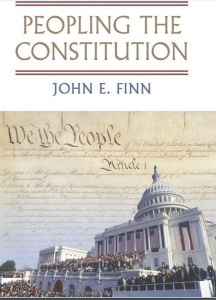Finn’s New Book Offers Moral, Philosophical Interpretation of Constitution

John Finn, professor of government, is the author of Peopling the Constitution (Constitutional Thinking), published by the University Press of Kansas on Feb. 24.
According to the University Press of Kansas, Peopling the Constitution outlines a very different view of the Constitution as a moral and philosophical statement about who we are as a nation. This “Civic Constitution” constitutes us as a civic body politic, transforming “the people” into a singular political entity. Juxtaposing this view with the legal model, the “Juridic Constitution,” Finn offers a comprehensive account of the Civic Constitution as a public affirmation of the shared principles of national self-identity, and as a particular vision of political community in which we the people play a significant and ongoing role in achieving a constitutional way of life. The Civic Constitution is the constitution of dialogical engagement, of contested meanings, of political principles, of education, of conversation.
Peopling the Constitution offers a new interpretation of the American constitutional project in an effort to revive a robust understanding of citizenship. It considers the entire constitutional project, from its founding and maintenance to its failure, with insights into topics ranging from the practice of deliberative democracy and the meaning of citizenship, to constitutional fidelity, civic virtue, the separation of powers, federalism, and constitutional interpretation. The Civic Constitution, in Finn’s telling, is primarily a political project requiring an active, engaged, and most importantly, constitutionally educated citizenry committed to the civic virtues of civility and tending. When we as citizens are unwilling or unable to tend to and sustain the Constitution, and when constitutional questions reduce to legal questions and obscure civic interests, constitutional rot results. And in post-9/11 America, Finn argues, constitutional rot has begun to set in.

